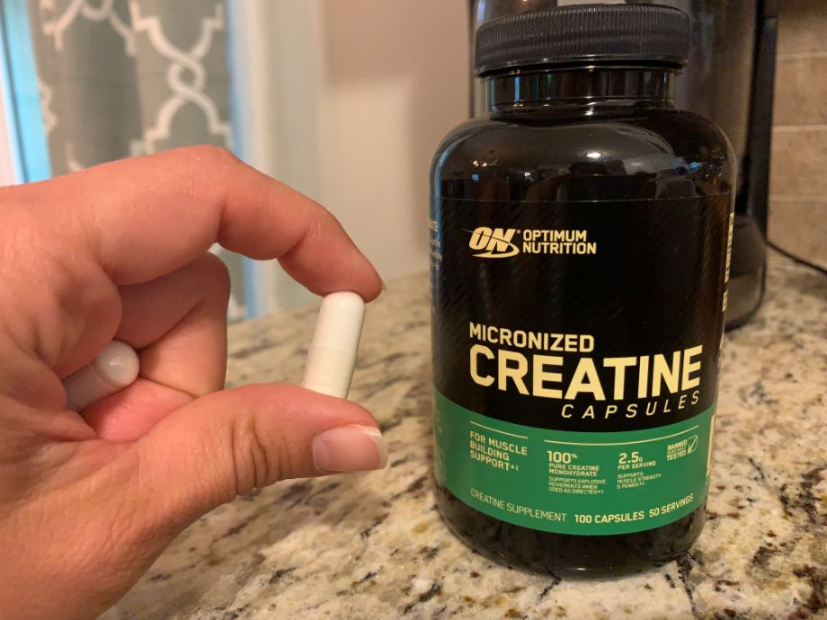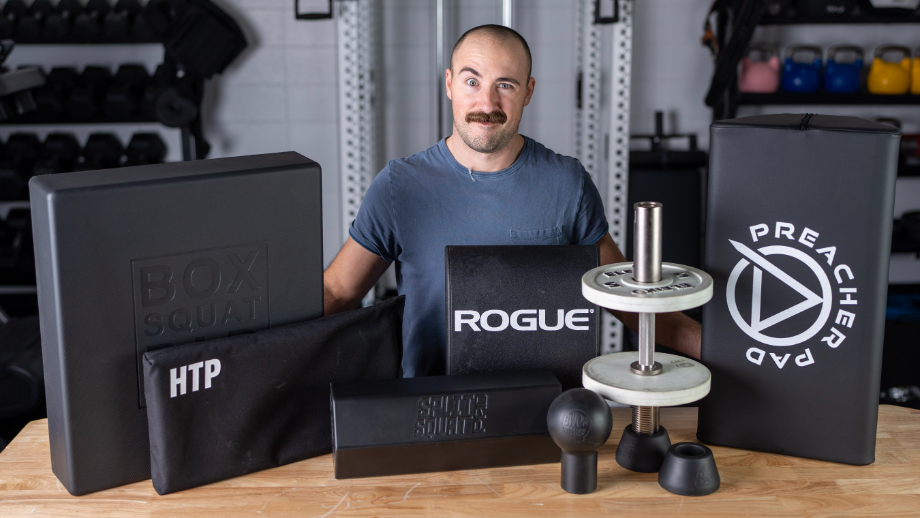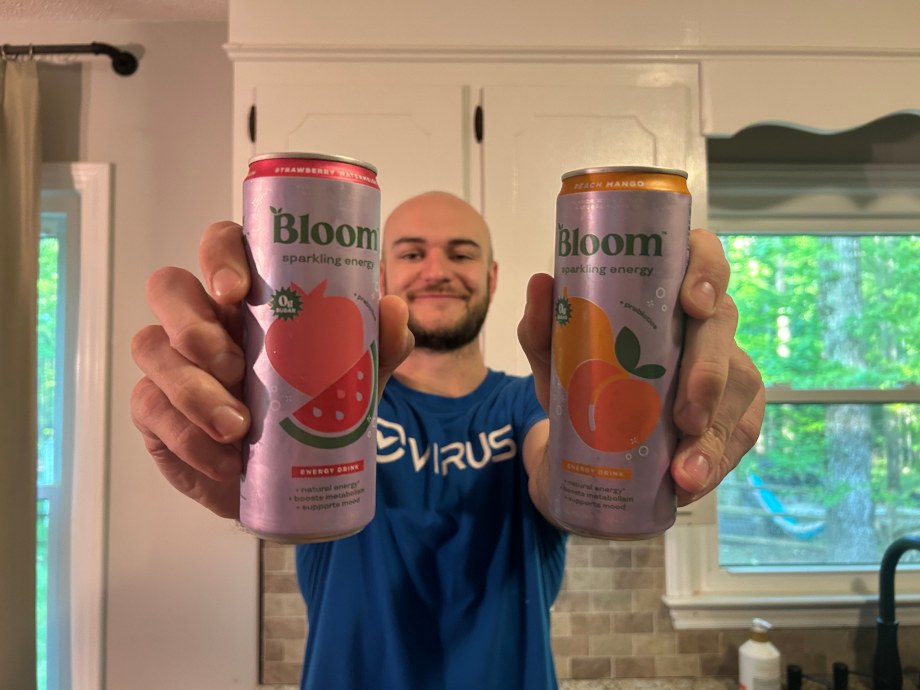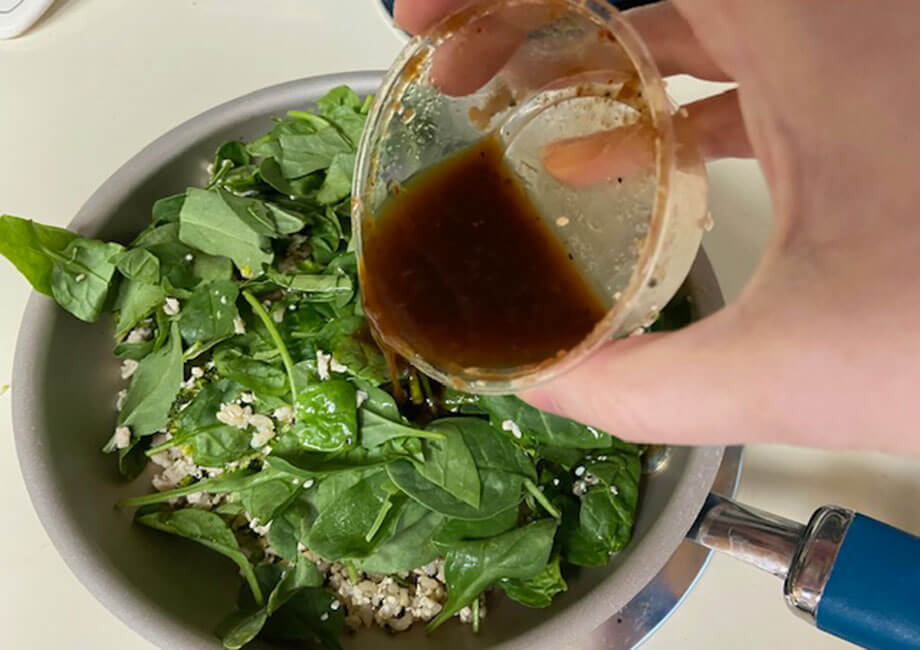Creatine and pre-workout are two of the most popular fitness supplements, and as such, gym goers have a lot of questions about them—namely, if you can only get one, which one should it be?
If you’re serious about improving your athletic performance, you’ll want to read our guide to creatine vs pre-workout, where we answer that question and many more about these two popular supplements.
Medical disclaimer: This article is intended for educational and informational purposes only. It is not intended as a substitute for medical advice. For health advice, contact a licensed healthcare provider.
What Is Creatine And What Does it Do?
Creatine1 is a compound found in the body called an endogenous amino acid. It’s composed of three amino acids: arginine, methionine, and glycine.
If you’re been looking into exercise performance, bodybuilding, and muscle recovery in any capacity, you’ve probably already heard or read that amino acids are the building blocks of proteins2.
There are hundreds of amino acids in the world, but humans only need about 20 to properly repair and build muscle. Of those 20, nine are essential (meaning we must get them from food) and 11 are non-essential, meaning our bodies create them on their own.
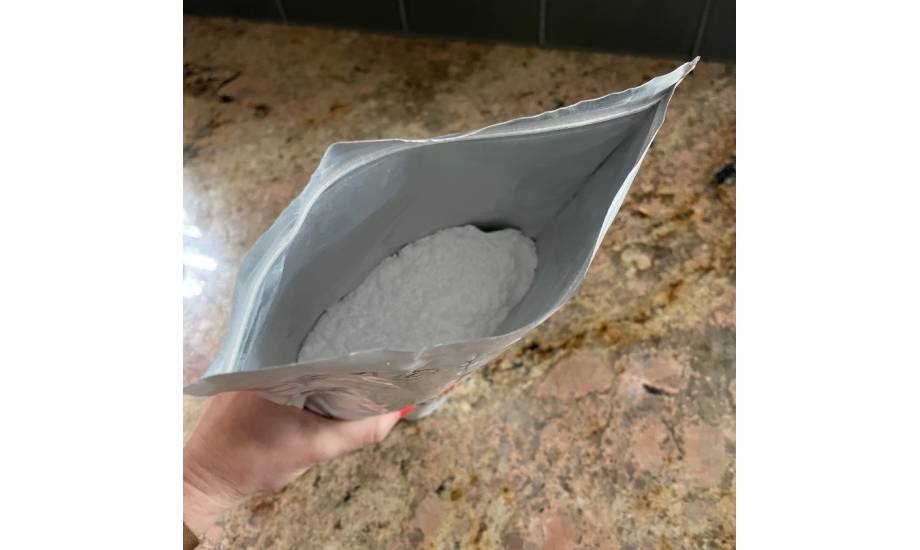
Creatine is composed of nonessential amino acids; it and its components are things your body already makes. However, supplementing with creatine can increase creatine stores in the body and lead to a number of potential performance benefits.
There are a few forms of creatine supplements, including creatine phosphate, creatine monohydrate, and creatine HCl.
How Much Creatine Should I Take? (Creatine Dosage)
One way to dose creatine is to start with a loading phase, which is thought to effectively saturate creatine stores in the muscle tissue, according to a 2021 double-blind study in the Journal of the International Society of Sports Nutrition9. The loading phase refers to a short period of time, typically five to seven days, during which you’ll intake a large amount of creatine.
The loading dosage is 20 to 25 grams per day, and you’ll split it up into four to five doses per day. After the loading phase, you’ll switch to a maintenance dose of 3 to 5 grams per day, according to the International Society of Sports Nutrition10. This much is necessary for retention of creatine muscle stores.
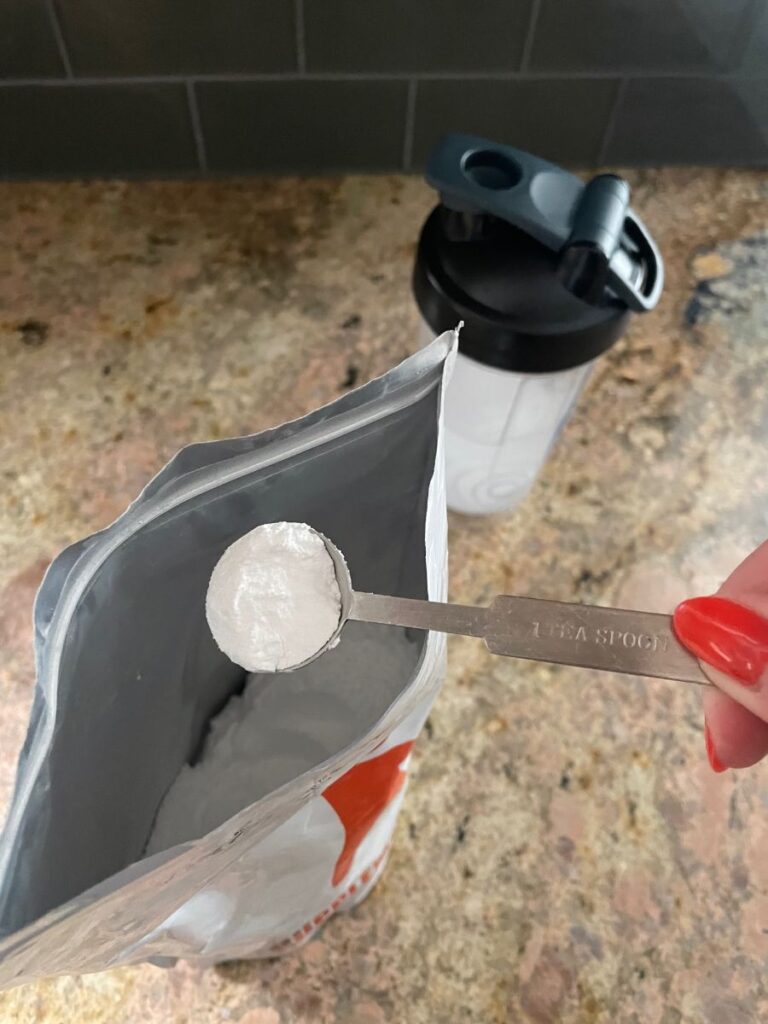
That said, the best creatine supplements contain 3 to 5 grams of creatine per serving.
Although creatine is generally considered safe, some people do experience side effects, primarily short-term bloating. People who have kidney dysfunction should know that taking too much creatine could result in excess creatinine, a waste product left over from energy processes that occur in your muscles. Healthy kidneys should filter this out.
Best Time to Take Creatine
Some research, specifically this 2013 study in the Journal of the International Society of Sports Nutrition11, posits that taking creatine shortly post-exercise elicits the best results.
Other research, including a 2015 study in the journal Applied Physiology, Nutrition, and Metabolism12 and a 2014 study in the journal Research in Sports Medicine13, found that there’s no difference in results whether you take creatine before or after a workout.
A 2021 study in the journal Nutrients14 reports that there’s not enough evidence to make a valid recommendation one way or the other, but that it’s likely that it’s better to take creatine shortly before or after exercise, rather than in isolation from exercise.
Benefits of Creatine
The positive effects of creatine are many, and they’re highly studied. In fact, creatine is one of the most studied sports supplements out there.
Dietary supplementation of creatine is known to:
- Replenish your body’s stores of adenosine triphosphate (ATP)3, a major player in muscle contraction
- Increase lean body mass/ lean muscle mass4
- Improve exercise endurance/work capacity5 during intense workouts
- Increase power6 and maximal strength7 in weightlifting
- Help muscles recover8 quicker during exercise (anti-fatigue properties)
RELATED: Best Creatine Supplements
What is Pre-Workout And What Does it Do?
Pre-workout is a fitness supplement that you take before a workout in order to enhance your performance in a variety of ways.
Pre-workouts usually contain some combination of these types of ingredients:
- Stimulants to enhance mental focus and energy
- Vasodilators/nitric oxide boosters to increase muscle pumps
- Nootropics to increase mental acuity and focus
- Amino acids that serve various purposes related to performance and recovery
- Bioavailability agents to increase absorption of all of the ingredients in the powder
How Much Pre-Workout Should I Take? (Pre-Workout Dosage)

Follow the instructions on your pre-workout supplement to determine how much pre-workout you should take. It’s important not to exceed the recommended serving size per day for any supplement, but especially for pre-workout, since caffeine toxicity27 is a very real and scary possibility. Also note that the side effects of beta-alanine—the tingling sensations called paresthesia—intensifies as the dose increases. If you’re new to pre-workout, it might be best to start with half of a dose, assess your tolerance, and then gradually increase from there if you see fit.
Best Time to Take Pre-Workout
Like the name suggests, the best time to take pre-workout is… (drum roll please) … before your workout. But, we can get a little bit more specific than that.
Taking a pre-workout supplement a few hours before your workout won’t do much, except perhaps make you want to itch all of your skin off. Conversely, taking your pre as you’re walking into the gym means you won’t start feeling the full effects until mid-workout.
The sweet spot tends to be 30 to 60 minutes prior, depending on your tolerance to the ingredients, specifically caffeine. People new to pre-workout or those who are super sensitive to stimulants can probably get away with 30 minutes.
RELATED: Best Pre-Workout for Men
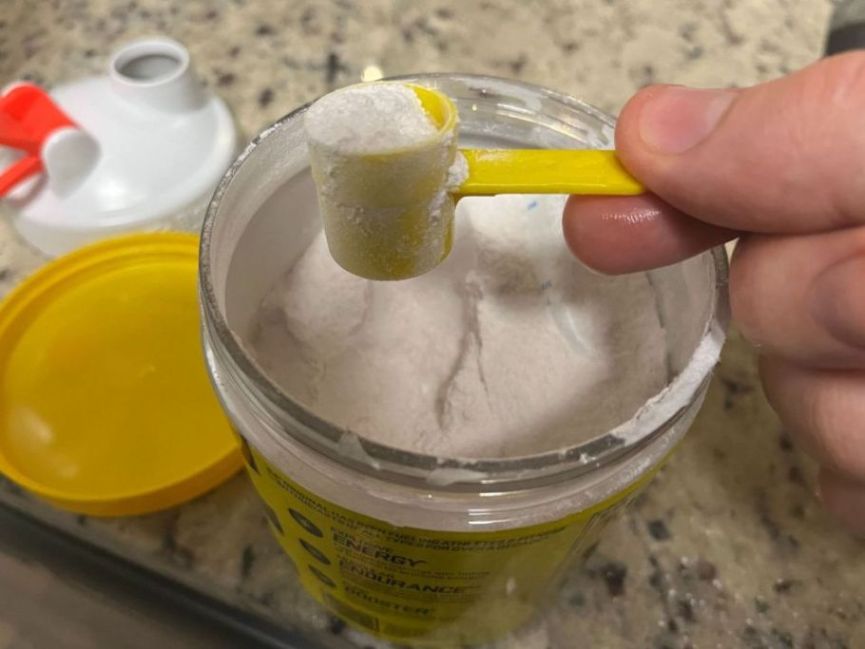
Most people probably want to aim for around 45 to 60 minutes before their workout to allow the caffeine enough time to start doing its thing. Why? According to a book on the pharmacology of caffeine28, the substance peaks in your body anywhere from 15 to 120 minutes after consumption, but it’s commonly said that the maximum effect of caffeine takes place around 60 minutes after consumption29.
Other pre-workout ingredients work across varying time frames. Levels of BCAA in the blood, for example, tend to spike at around 30 minutes after consumption, according to a 2012 study in the Journal of International Sports Nutrition30.
For most ingredients in pre-workout, the optimal consumption time frame has yet to be determined, so it’s best to go off of the one we know the most about: caffeine.
One thing’s for certain: You don’t want to take pre-workout post-workout, and definitely not right before bed!
Benefits of Pre-Workout
The exact benefits of pre-workout differ depending on the ingredients used. Here’s a look at some common pre-workout ingredients and how they can help improve your workout performance:
- Caffeine: Stimulant, provides an energy boost
- BCAAs (branched-chain amino acids leucine, isoleucine, valine): Agents for performance enhancement by various mechanisms15
- Citrulline malate (L-citrulline and malate, often as malic acid): Nitric oxide booster16
- Beta-alanine: Increases exercise capacity and decreases muscle fatigue by sparking carnosine production17
- Betaine anhydrous: Boosts carnitine production and may improve muscle endurance18
- Black pepper extract, often as BioPerine: Bioavailability agent19 that helps the body absorb more of the consumed nutrients
- Beet root extract/powder: Nitric oxide booster20
- Pomegranate: Nitric oxide booster21
- Taurine: Amino acid and antioxidant that may prevent catabolism22 (breakdown of muscle fiber)
- Arginine: Amino acid that may improve aerobic and anaerobic performance23
- L-theanine: Amino acid and nootropic thought to increase focus and mental acuity24
- L-carnitine: Amino acid that may aid in recovery after exercise25
- Tyrosine: Amino acid that may have anti-fatigue effects26
- Creatine: Endogenous amino acid highly studied for its effects on power, muscle strength, and endurance
The best pre-workout formulas will contain multiple ingredients, but not necessarily all of the above. Also, be aware of proprietary blends and choose products with full labeling transparency.
Creatine vs Pre-Workout: Key Differences
Both creatine and pre-workout can improve sports performance and exercise performance in a number of ways.
The main difference between the two supplements is that pre-workout contains many ergogenic ingredients and creatine supplements contain mainly creatine, perhaps with an added bioavailability agent and, of course, ingredients for taste and texture.
Additionally, pre-workout includes stimulants to boost energy levels and focus, while creatine powder does not. Pre-workout may help you perform more reps during resistance training and keep up high-intensity exercise for longer due to the stimulants.
Can I Use Creatine As Pre-Workout?

You can use creatine as pre-workout if you want, but it won’t have the same effect as a true pre-workout supplement. If you’re looking for the “buzz” that comes with pre-workout, you’ll need something that contains caffeine (responsible for energy and focus), beta-alanine (responsible for the tingles), and a vasodilator like beet root extract (responsible for increased nitric oxide production, which increases blood flow and contributes to the pump).
Pre-Workouts with Creatine — Should You Take Both Together?
You can absolutely take creatine and pre-workout together! Many pre-workout supplements contain creatine to give you an extra boost in the gym, which makes sense, and it might be worthwhile to look for such a pre-workout depending on how long you’ve been using creatine. Since creatine requires a loading phase, a beginner might require a separate creatine supplement to ensure they’re getting enough.
If you do use a pre-workout with creatine, make sure it contains at least 3 grams per serving. If your favorite pre-workout contains less than that, you might also need a separate creatine supplement.
Creatine vs Pre-Workout: Final Thoughts
Creatine and pre-workout are not one and the same. While pre-workout contains multiple ingredients that work to enhance performance, creatine is a single ingredient (although some creatine supplements contain other ingredients as well). Some pre-workout supplements contain creatine, too.
- Creatine is known to improve physical performance and can lead to increases in muscle mass and strength. It is sometimes included in pre-workout supplements, but you can also take it individually.
- Pre-workout supplements contain many ingredients, primarily stimulants like caffeine and compounds that work as vasodilators. Vasodilators are responsible for the “pump” you get when working out on pre-workout.
Creatine vs Pre-Workout: Q&A
To wrap up, let’s look at some commonly asked questions about creatine and pre-workout.
Can you take creatine and pre-workout together?
Yes, you can take pre-workout and creatine together. In fact, many pre-workouts contain creatine. The creatine dosage in pre-workout supplements generally is not as high as it is in creatine-specific supplements, though.
Is creatine the same as pre-workout?
No, creatine is not the same as pre-workout, but it is an ingredient in some pre-workouts.
Does creatine give you energy before working out?
Creatine itself isn’t a stimulant, so it won’t give you energy in the way that caffeine does. However, if you take a supplement that contains creatine and a stimulant, it should provide energy.
Which is better: creatine or pre-workout?
One supplement isn’t necessarily better than the other. Creatine is a single ingredient that can act as an ergogenic aid, while pre-workout contains multiple ingredients known to act as ergogenic aids. It all depends on what you’re looking to get out of your supplements. If you’re not interested in stimulants and other common pre-workout ingredients, creatine would be the way to go.
These statements have not been evaluated by the Food and Drug Administration. This product is not intended to diagnose, treat, cure, or prevent any diseases.
References
- Kreider RB, Stout JR. Creatine in Health and Disease. Nutrients. 2021;13(2):447. Published 2021 Jan 29. doi:10.3390/nu13020447
- National Research Council (US) Subcommittee on the Tenth Edition of the Recommended Dietary Allowances. Recommended Dietary Allowances: 10th Edition. Washington (DC): National Academies Press (US); 1989. 6, Protein and Amino Acids. Available from: https://www.ncbi.nlm.nih.gov/books/NBK234922/
- Clark JF. Creatine and phosphocreatine: a review of their use in exercise and sport. J Athl Train. 1997;32(1):45-51.
- Wu SH, Chen KL, Hsu C, et al. Creatine Supplementation for Muscle Growth: A Scoping Review of Randomized Clinical Trials from 2012 to 2021. Nutrients. 2022;14(6):1255. Published 2022 Mar 16. doi:10.3390/nu14061255
- Bogdanis GC, Nevill ME, Aphamis G, et al. Effects of Oral Creatine Supplementation on Power Output during Repeated Treadmill Sprinting. Nutrients. 2022;14(6):1140. Published 2022 Mar 8. doi:10.3390/nu14061140
- Izquierdo M, Ibañez J, González-Badillo JJ, Gorostiaga EM. Effects of creatine supplementation on muscle power, endurance, and sprint performance. Med Sci Sports Exerc. 2002;34(2):332-343. doi:10.1097/00005768-200202000-00023
- Wang CC, Fang CC, Lee YH, Yang MT, Chan KH. Effects of 4-Week Creatine Supplementation Combined with Complex Training on Muscle Damage and Sport Performance. Nutrients. 2018;10(11):1640. Published 2018 Nov 2. doi:10.3390/nu10111640
- Wang CC, Lin SC, Hsu SC, Yang MT, Chan KH. Effects of Creatine Supplementation on Muscle Strength and Optimal Individual Post-Activation Potentiation Time of the Upper Body in Canoeists. Nutrients. 2017;9(11):1169. Published 2017 Oct 27. doi:10.3390/nu9111169
- Gann JJ, McKinley-Barnard SK, Andre TL, Schoch RD, Willoughby DS. Effects of a traditionally-dosed creatine supplementation protocol and resistance training on the skeletal muscle uptake and whole-body metabolism and retention of creatine in males. J Int Soc Sports Nutr. 2015;12(Suppl 1):P2. Published 2015 Sep 21. doi:10.1186/1550-2783-12-S1-P2
- Kreider RB, Kalman DS, Antonio J, et al. International Society of Sports Nutrition position stand: safety and efficacy of creatine supplementation in exercise, sport, and medicine. J Int Soc Sports Nutr. 2017;14:18. Published 2017 Jun 13. doi:10.1186/s12970-017-0173-z
- Antonio J, Ciccone V. The effects of pre versus post workout supplementation of creatine monohydrate on body composition and strength. J Int Soc Sports Nutr. 2013;10:36. Published 2013 Aug 6. doi:10.1186/1550-2783-10-36
- Candow DG, Vogt E, Johannsmeyer S, Forbes SC, Farthing JP. Strategic creatine supplementation and resistance training in healthy older adults. Appl Physiol Nutr Metab. 2015;40(7):689-694. doi:10.1139/apnm-2014-0498
- Candow DG, Zello GA, Ling B, et al. Comparison of creatine supplementation before versus after supervised resistance training in healthy older adults. Res Sports Med. 2014;22(1):61-74. doi:10.1080/15438627.2013.852088
- Ribeiro F, Longobardi I, Perim P, et al. Timing of Creatine Supplementation around Exercise: A Real Concern?. Nutrients. 2021;13(8):2844. Published 2021 Aug 19. doi:10.3390/nu13082844
- Neinast M, Murashige D, Arany Z. Branched Chain Amino Acids. Annu Rev Physiol. 2019;81:139-164. doi:10.1146/annurev-physiol-020518-114455
- Gough LA, Sparks SA, McNaughton LR, et al. A critical review of citrulline malate supplementation and exercise performance. Eur J Appl Physiol. 2021;121(12):3283-3295. doi:10.1007/s00421-021-04774-6
- Hill CA, Harris RC, Kim HJ, et al. Influence of beta-alanine supplementation on skeletal muscle carnosine concentrations and high intensity cycling capacity. Amino Acids. 2007;32(2):225-233. doi:10.1007/s00726-006-0364-4
- Arazi H, Aboutalebi S, Taati B, Cholewa JM, Candow DG. Effects of short-term betaine supplementation on muscle endurance and indices of endocrine function following acute high-intensity resistance exercise in young athletes. J Int Soc Sports Nutr. 2022;19(1):1-16. Published 2022 Mar 22. doi:10.1080/15502783.2022.2041988
- Kesarwani K, Gupta R, Mukerjee A. Bioavailability enhancers of herbal origin: an overview. Asian Pac J Trop Biomed. 2013;3(4):253-266. doi:10.1016/S2221-1691(13)60060-X
- Clifford T, Howatson G, West DJ, Stevenson EJ. The potential benefits of red beetroot supplementation in health and disease. Nutrients. 2015;7(4):2801-2822. Published 2015 Apr 14. doi:10.3390/nu7042801
- Roelofs EJ, Smith-Ryan AE, Trexler ET, Hirsch KR, Mock MG. Effects of pomegranate extract on blood flow and vessel diameter after high-intensity exercise in young, healthy adults. Eur J Sport Sci. 2017;17(3):317-325. doi:10.1080/17461391.2016.1230892
- De Carvalho FG, Galan BSM, Santos PC, et al. Taurine: A Potential Ergogenic Aid for Preventing Muscle Damage and Protein Catabolism and Decreasing Oxidative Stress Produced by Endurance Exercise. Front Physiol. 2017;8:710. Published 2017 Sep 20. doi:10.3389/fphys.2017.00710
- Viribay A, Burgos J, Fernández-Landa J, Seco-Calvo J, Mielgo-Ayuso J. Effects of Arginine Supplementation on Athletic Performance Based on Energy Metabolism: A Systematic Review and Meta-Analysis. Nutrients. 2020;12(5):1300. Published 2020 May 2. doi:10.3390/nu12051300
- Baba Y, Inagaki S, Nakagawa S, Kaneko T, Kobayashi M, Takihara T. Effects of l-Theanine on Cognitive Function in Middle-Aged and Older Subjects: A Randomized Placebo-Controlled Study. J Med Food. 2021;24(4):333-341. doi:10.1089/jmf.2020.4803
- Fielding R, Riede L, Lugo JP, Bellamine A. l-Carnitine Supplementation in Recovery after Exercise [published correction appears in Nutrients. 2018 Apr 26;10(5):]. Nutrients. 2018;10(3):349. Published 2018 Mar 13. doi:10.3390/nu10030349
- Williams M. Dietary supplements and sports performance: amino acids. J Int Soc Sports Nutr. 2005;2(2):63-67. Published 2005 Dec 9. doi:10.1186/1550-2783-2-2-63
- Murray A, Traylor J. Caffeine Toxicity. [Updated 2022 Aug 14]. In: StatPearls [Internet]. Treasure Island (FL): StatPearls Publishing; 2022 Jan-. Available from: https://www.ncbi.nlm.nih.gov/books/NBK532910/
- Institute of Medicine (US) Committee on Military Nutrition Research. Caffeine for the Sustainment of Mental Task Performance: Formulations for Military Operations. Washington (DC): National Academies Press (US); 2001. 2, Pharmacology of Caffeine. Available from: https://www.ncbi.nlm.nih.gov/books/NBK223808/
- Caffeine: how long it lasts, how much & withdrawals. Cleveland Clinic.
- Kim DH, Kim SH, Jeong WS, Lee HY. Effect of BCAA intake during endurance exercises on fatigue substances, muscle damage substances, and energy metabolism substances. J Exerc Nutrition Biochem. 2013;17(4):169-180. doi:10.5717/jenb.2013.17.4.169


